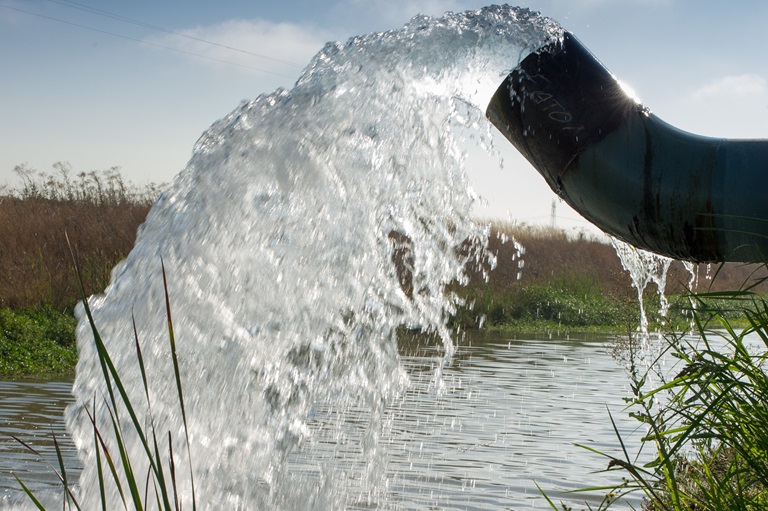Why Conserving Water Today Means More Groundwater for Tomorrow
Groundwater is pumped from a production well to a nearby agricultural canal in Yolo County. Many Californians rely on groundwater for drinking and home use.
Groundwater is California’s water savings bank account that can be tapped during dry years when water in lakes and rivers are low. Conserving water helps preserve groundwater, which is important for plants, animals and people.
What is Groundwater?
Groundwater comes from rain and melting snow that seeps down into the ground and is stored in aquifers. An aquifer is a body of porous rock or sediment saturated with groundwater. Groundwater can move through the aquifer and resurface through springs or be pumped to the surface using manmade wells.
Why Is Groundwater Important?
Groundwater provides 40 percent of the State’s water in a normal year and up to 60 percent during dry years. For some California communities including Chico, Monterey and South Lake Tahoe, groundwater is their only source of tap water for drinking, cooking, and other household uses.
Groundwater supports jobs for millions of Californians when it is used in manufacturing, agriculture, fruit and vegetable processing, high tech, petroleum refining, beverage production, and other businesses. Many cities and towns rely on these jobs to support their residents and to provide revenue.
Groundwater also replenishes rivers, lakes and streams that support animals, plants and fish. Some plants and animals that depend on groundwater are rare, unique, or threatened. Groundwater-dependent ecosystems include natural springs and seeps, and deep-rooted plant communities.
While groundwater is an important water resource in California, it has also been overused for too many years. Overpumping groundwater leads to problems, such as subsidence, which is when the aquifer compacts and the ground above sinks. This can damage roads, bridges, canals and levies. Overpumping can also cause shallow wells to go dry or the water can become contaminated.
The Sustainable Groundwater Management Act (SGMA) addresses the issues of overpumping and provides a framework for locals to come together to create plans to manage their groundwater for long term sustainability. The Department of Water Resources (DWR) is helping local agencies as they create their groundwater sustainability plans by providing technical, planning and financial assistance. DWR has also been charged with reviewing the plans once they are submitted and determining if they are likely to achieve sustainability over a 20-year period.
Conserving water helps conserve California’s groundwater so it can continue to support people, food production, natural ecosystems, and jobs.
For more information on groundwater and SGMA, visit the DWR website.
